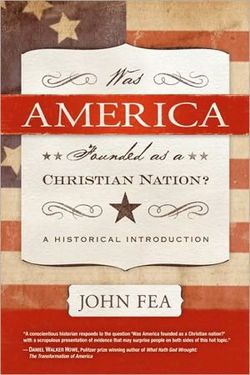 Today is Presidents’ Day, and while we’re debating key points like where to put the apostrophe in Presidents’ Day (I vote for the plural form, as we are celebrating many presidents), we can also take a moment to think about religion and the Founders of the United States.
Today is Presidents’ Day, and while we’re debating key points like where to put the apostrophe in Presidents’ Day (I vote for the plural form, as we are celebrating many presidents), we can also take a moment to think about religion and the Founders of the United States.
All this week, historian John Fea will be writing for Newsweek’s “On Faith” site abut his new book, Was America Founded as a Christian Nation?: A Historical Introduction. I love the book, which takes up the perennial questions of our nation’s founding and attempts to determine whether it was intended to be a Christian state.
Short version: secularists will be dismayed to discover that one of the reasons that the U.S. Constitution is so silent about religion is that the various state constitutions had so very much to say. Many states required religious oaths for officeholders, including declarations of Christian belief; and many had established churches as their official, tax-supported religions. Even Vermont, which prides itself on nonconformist independence, had in its first constitution provisions to grant full civil liberties only to those who “profess the protestant religion.”
However, Tea Party folks can’t start dancing just yet. In Part Three of the book, Fea goes founder by founder to ask whether the framers of our Constitution were orthodox Christians, as books like Peter Marshall and David Manuel’s The Light and the Glory claim. Although there were several bona fide professing Christians among the founders (including, ironically, Samuel Adams, who is now known almost solely as the face on every bottle of his eponymous libation), it’s harder to make a case for some of the heavyweights. Thomas Jefferson, who considered himself a follower of Jesus, would not have passed any of the religious oath tests of his day, and George Washington believed in Providence but clearly shied away from organized religion–especially after the Revolution. After the war, he never took communion again. Then, too, apocryphal stories about Washington’s famous prayer at Valley Forge turn out to be just that: apocryphal. The man who claimed to have witnessed the prayer did not even live in Valley Forge at the time, and he certainly didn’t rush home to tell his wife Sarah about the prayer: he did not marry her for another quarter century.
What’s great about Fea’s book is that his only agenda is to understand history, not to further a political cause one way or the other. An endorsement from Pulitzer prize winner Daniel Walker Howe (What God Hath Wrought) sums it up perfectly: the book amasses “a scrupulous presentation of evidence that may surprise people on both sides of this hot topic.”

